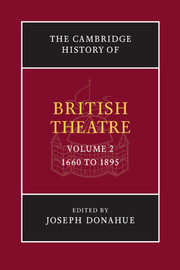Book contents
- Frontmatter
- Part I 1660 to 1800
- 1 Introduction: the theatre from 1660 to 1800
- 2 Theatres and repertory
- 3 Theatre and the female presence
- 4 Theatre, politics and morality
- 5 Theatre companies and regulation
- 6 The Beggar’s Opera A case study
- 7 Garrick at Drury Lane, 1747–1776
- 8 Theatre outside London, 1660–1775
- 9 1776 A critical year in perspective
- 10 The theatrical revolution, 1776–1843
- Part II 1800 to 1895
- Bibliography
- Index
- References
8 - Theatre outside London, 1660–1775
from Part I - 1660 to 1800
Published online by Cambridge University Press: 28 March 2008
- Frontmatter
- Part I 1660 to 1800
- 1 Introduction: the theatre from 1660 to 1800
- 2 Theatres and repertory
- 3 Theatre and the female presence
- 4 Theatre, politics and morality
- 5 Theatre companies and regulation
- 6 The Beggar’s Opera A case study
- 7 Garrick at Drury Lane, 1747–1776
- 8 Theatre outside London, 1660–1775
- 9 1776 A critical year in perspective
- 10 The theatrical revolution, 1776–1843
- Part II 1800 to 1895
- Bibliography
- Index
- References
Summary
Written records relating to the post-Restoration and early eighteenth-century development of theatre outside London are relatively scarce, but from the available source material a picture emerges of entrepreneurial London actors determined to bring the drama to an increasingly numerous and demanding provincial audience. Whilst theatre outside London thus maintained a strong link with the capital, the relationship was a complex one, not least because the political and social conditions under which provincial companies operated differed considerably between Ireland, Scotland and England. In order to highlight these important variations a separate section will be devoted to each.
Ireland
In Ireland the post-Restoration theatre operated under conditions similar to those of the London patent houses; that is, under the protection and control of a royal patent granted in 1661. The patentee was John Ogilby who had been the Irish Master of the Revels at Dublin’s vice-regal court before the Interregnum. In 1637 he had erected a small playhouse in Werburgh Street for the benefit of the vice-regal court and resident English government officials. When, in 1660, a new viceroy was established in Dublin, Ogilby lost no time in getting himself reappointed to his old post at the Irish Revels Office, taking care, at the same time, to obtain a royal patent which gave him the right not only to present plays and operas, but also to erect and license theatres anywhere in Ireland and to license other performers. Ogilby began his second tenure by erecting a new theatre situated in Smock Alley, the Werburgh Street playhouse being, by now, too dilapidated for use.
- Type
- Chapter
- Information
- The Cambridge History of British Theatre , pp. 165 - 182Publisher: Cambridge University PressPrint publication year: 2004

